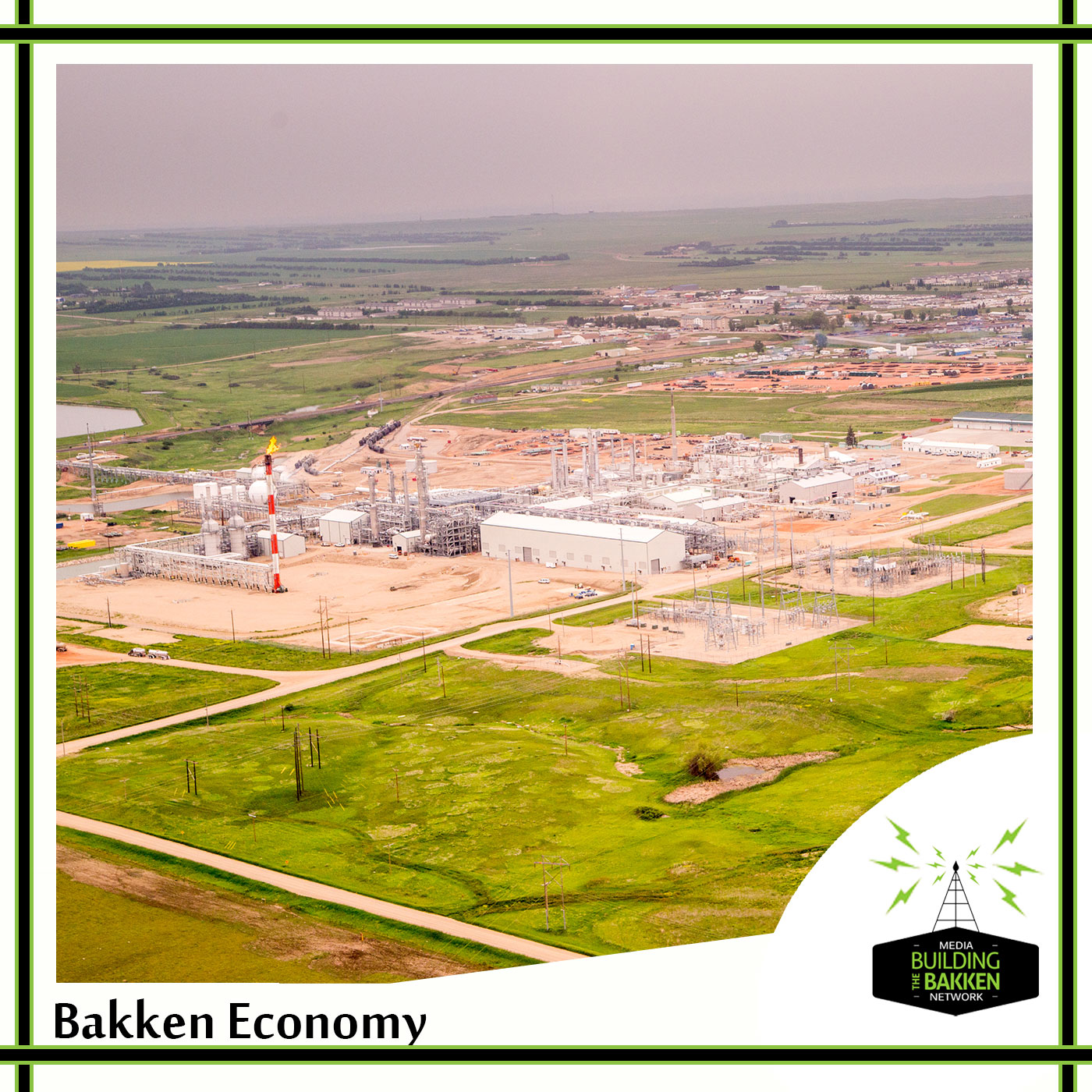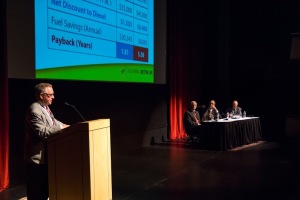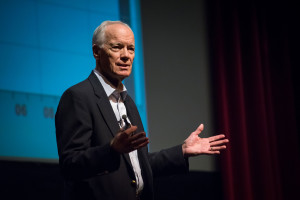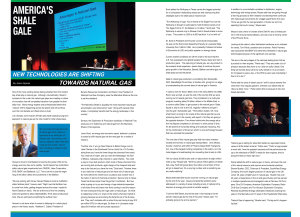


One of the more exciting stories being extracted from the modern day shale play is natural gas. Although volumetrically it doesn’t compare to the crude, the natural gas plays are creating a culture of innovation that will completely transform how people live their daily lives. Many energy experts and professionals believe this “natural” shift is happening across the planet and will continue over the next decade as infrastructure is built.
U.S. Senator John Hoeven (R-ND) sees North Dakota’s long term approach to natural gas as the role model for other shale plays.
“We are producing huge amounts of natural gas which really is a byproduct of our drilling for oil,” Hoeven said. “But the key is we have to capture it rather than flare it and get it to market. Part of that is creating a market for that natural gas.”
Hoeven’s drive for the Bakken to become the poster child for the energy economy has some validity. North Dakota has multi-billion dollar natural gas investments from ONEOK, Hess Corporation, CHS, BNSF, and Badlands, LLC. Turns out this is just the beginning of the billion dollar announcements in the Bakken.

“We are working with Cenex Harvest States to build a multibillion dollar fertilizer plant,” Hoeven said. “Right now that fertilizer has to come from India, getting shipped across the ocean, hauled to North Dakota on trains. We are at the end of the line creating costs and questions about dependability. Think about producing it here. We are just barely scratching the surface here.”
Hoeven is not alone when it comes to lobbying for a shale play’s place in the history books. Matthew D. Cabell, President of Seneca Resources Corporation and Senior Vice President of National Fuel Gas Company, sees the Marcellus Shale as the one to set the standard.
“The Marcellus Shale is arguably the most important natural gas accumulation ever discovered,” said. “Along with several other shales, it completely transformed the energy landscape in this country.”
Seneca, the Exploration & Production subsidiary of National Fuel, produces oil in California and natural gas from the Marcellus Shale in Pennsylvania.
Loren Scott, an energy and economic expert, believes Louisiana is poised to shift natural gas into the next gear for a variety of reasons.
“Number one, if you go New Orleans to Baton Rouge over to Lake Charles in the Southwest Corner, that’s the I-10 Corridor, along there you have the three things that chemical firms need. You need lots of water, and you have the Mississippi, the Gulf of Mexico, Calcasieu ship channel to Lake Charles. You need a way to move bulk product, which most of these chemical firms are moving bulk products, again barge is the cheapest ship and way to do that and you have the river,” Scott said. “Number three is you need lots of natural gas and we have lots of natural gas. So even before the recent boom Louisiana was number two in the nation in terms of chemical production. Second only to Texas. Texas has those same three things that I mentioned. But now what is going on is you are having a huge industrial expansion of all those firms and brand new firms coming in and the reason for that is because they are huge users of natural gas. So what is happening is the U.S. share of the world’s chemical market is growing because we are kicking the behinds out of the Europeans. They can’t compete with us when they are having to pay $12 per million BTU for natural gas. So there is in Louisiana today about $104 billion with announced expansion.”
Scott added the Wolfcamp in Texas carries the biggest potential for oil companies’ reallocating resources and restructuring their strategies due to the shale play’s massive size.

“The Wolfcamp is huge. You’ve heard of the Eagle Ford, but the Wolfcamp is thought or estimated to hold 50 billion barrels of oil. The Eagle Ford is 27, the Bakken is 13 billion,” Scott said. “The Wolfcamp is second only to Ghawar Field in Saudi Arabia in terms of size. This sucker is 3,500 to 4,500 feet thick. It is hot with oil.”
Dr. Scott is President and Founder Loren Scott & Associates. He was on the Economics Department faculty at Louisiana State University from 1969 to 1998. He is presently Professor Emeritus of Economics at LSU and public speaker on energy issues.
Current market conditions are off the chart to the tune that the U.S. has surpassed once global leaders Russia, Qatar and Iran in production gains. The capturing of natural gas, as a by-product to the massive shale expansion, seems likely to continue its prodigious growth in the Marcellus, Barnett, Bakken and other gas-rich shale plays across the planet.
Qatar’s natural gas production is something Ken DeCubellis, CEO, BlackRidge Oil and Gas, is familiar with, giving him an edge at understanding the current state of natural gas in America.
“I used to work for Exxon Mobil. And in the early 2000’s into 2006, Exxon was worried, as was the rest of the country that we were running out of natural gas here. They embarked on a multi-year program investing about 30 billion dollars in the Middle East, in a country called Qatar, to get access to the natural gas in Qatar, liquefy it, ship it over to the US, regasify it offshore and get it into the grid,” DeCubellis said. “Thirty billion dollars. OK. Now what Exxon is trying to do is take all the natural gas that we are producing here in this country and export it. So they are going in the opposite direction. Two drivers behind why the energy situation has flipped completely on its head in a short period of time. It’s the advent of horizontal drilling and hydraulic fracturing. And it’s the combination of those two which is very technology focused that has unlocked this potential.”
The one slice of this natural gas play that has many investors excited and worried, is natural gas transportation. Jerry Moyes, founder, chairman and CEO of Phoenix-based Swift Transportation, one of the largest trucking companies in the nation, is in the initial stages of investmenting into converting their trucks to LNG.
“We run about 20,000 trucks and run about seven to eight million miles a day,” Moyes said. “We’ll buy about million gallons of diesel fuel a day. Swift will gross about four billion and a billion of that will go to diesel fuel. It’s a very big number and is something we are really watching.”
Moyes estimated 200 trucks would be running on natural gas by the end of the year. Issues and potential solutions were addressed in a variety of areas including a lack of national infrastructure to energy price points to vehicle weights.
“I told the Wall Street Journal last year I was hoping to be ten percent natural gas by the end of this year,” Moyes said. “I’m probably going to be at one percent.”
In addition to uncontrollable variables in distribution, engine technology and energy prices, Moyes said they are going through a learning process as their research and development continues with natural gas conversions for a bigger payoff down the road.
“Once we get into the next generation of trucks we won’t be spending that much money,” Moyes said.
Moyes is also owner of charter airline Swift Air and a limited partner in the Arizona Diamondbacks, and was once a minority owner of the Phoenix Suns.

Looking at the nation’s other distribution backbone as an indicator for trends, Tom Petrie, president and chairman, Petrie Partners, said companies like BNSF are extremely interested in natural gas technologies because of the significant cost savings.
“We are in the early stages of the railroads testing their LNG as a product for their engines,” Petrie said. “They are under a lot of pressure because they have to run ultra low sulfur diesel. One thing we learned about ultra low sulfur diesel is it is a lot easier for Congress to pass a law, or the EPA to pass rules mandating it than it is to do it.”
Petrie said the price of diesel used to “sell for about seventy-five cents less” than regular gasoline, whereas now diesel sells for “about a dollar more.” Petrie claims this is because of ultra low diesel standards.
“Natural gas is selling for about $24 dollars an equivalent barrel, versus a $104 dollars a barrel,” Petrie said. “That’s a huge spread to work with. Now the question becomes will the performance be up to the standards of BNSF’s needs for their engines, they’re doing the tests on them right now.”
Petrie added the shift to natural gas, in theory, will lower the cost of the natural resource and improve environmental practices.

Steven Mueller, CEO, Chairman & President, SouthWest Energy Company, the fourth largest producer of natural gas in the US Lower 48, sees a bright future in natural gas. Mueller has over 30 years of experience in the oil and gas industry and has served in multiple operational and managerial roles at Tenneco Oil Company, Fina Oil Company, American Exploration Company, Belco Oil & Gas Company and The Houston Exploration Company. Recently SouthWest Energy celebrated milestones marking five years in the Marcellus and 10 years in the Fayetteville Shale play.
“Natural Gas is happening,” Mueller said. “It’s big and it’s happening fast.”
Article was featured in Oil and Gas Monthly magazine. Click here for the magazine.



Leave a Reply